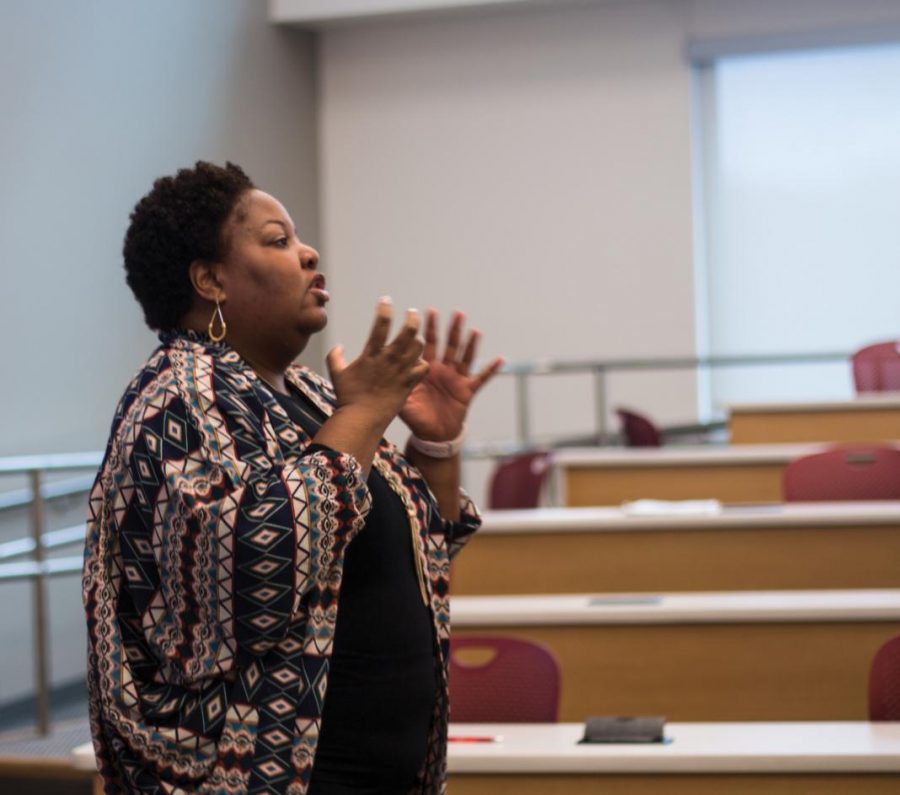At the end of a year that has been full of tense racial issues on campus, including the posting of anti-black flyers and vandalism that included anti-black graffiti, the Black Faculty and Staff Association of the University of Utah hosted the 2018 State of Utah Black Affairs Summit on April 7. The event was held from 8:30 a.m. until 4 p.m. in the Spencer Fox Eccles Business Building. On the agenda were a variety of speakers, panels, breakout sessions and networking opportunities for researchers, community activists, politicians, educators, policymakers and students.
About the Event, Speakers
Summit Chair Teshia Griswold, who is also co-chair of the Black Faculty and Staff Association and a member of the campus’s Presidential Anti-Racism Task Force, kicked off the event by introducing keynote speaker Emma Houston. Houston, an activist and Director of Diversity and Inclusion at the Salt Lake City Mayor’s Office, explained that the State of Utah Black Affairs Summit introduces forward-thinking leaders, unites the community in discussing critical issues and connects generations from different eras.
“It forms meaningful connections and shares invaluable knowledge and resources,” Houston said. “This event is imperative for everyone in the state of Utah.”
Following the keynote address, attendees were divided into breakout sessions. The presenters for the sessions included Isaac Ewaleifoh, Alex Quayson-Sackey, Andy Iheanacho, Nicole Robinson and a student panel.
Robinson is the associate vice president for Equity and Diversity at the U and she is the leadership fellow for the Senior Vice President of Academic Affairs Office. She spoke about specific struggles in education and lifelong success for students of traditionally marginalized racial and ethnic groups. Along with this topic, her research focuses on access to quality music education for disadvantaged groups, inequalities in music education programs and conceptualizing practices to support inclusivity among music educators.
Systemic Racism
Robinson’s speech addressed contributing factors of low achievement among poor minority children, the disproportionate representation of underserved children in special needs programs and the expansion of the achievement gap between white and non-white students in the United States.
Robinson compared systemic racism to racial bigotry, where the existence of institutional policies and economic and political structures place minority and ethnic groups at a disadvantage. Quoting the novel “Higher Education in Transition” by John Seiler Brubacher and Willis Rudy, she said, “Institutions of higher education were designed to groom and prepare white gentlemen for entry into leadership in civic and professional life.”
After Barack Obama’s presidency, Robinson feels many people misperceived that the U.S. is a post-racial society. However, she said since President Donald Trump’s election, there has been an increase in hate crimes, emboldened white supremacists and intensified anti-immigration rhetoric. She pointed out that, according to the Bureau of Labor Statistics, black Americans are twice as likely to be unemployed, and according to the National Institutes of Health, healthcare professionals carry a bias against minority populations. Additionally, blacks make up 13 percent of America’s general population and 32 percent of America’s prison population, according to the National Association for the Advancement of Colored People. One of Robinson’s most pressing concerns is how the education system in the U.S. contributes to these statistics.
Education Isn’t Equal
Kindergarten is the first place where minority children from low-income families begin falling behind, Robinson said. She explained many minority children come from single-parent homes below the federal poverty line, with parents who have less than a high school education and may not speak English. Parents who don’t understand what students need to know prior to kindergarten send their kids to school without the basic knowledge of numbers, letters and colors. Children are then evaluated on this knowledge and fail standardized tests.
The problem is compounded by large class sizes in metropolitan areas. Low-income families tend to be corralled into cities, where jobs are plentiful and state-subsidized housing is available. At underfunded schools in communities with a high density of people, class sizes often exceed 20 students, which is considered to be the point where the ability to teach effectively begins to decline. Teachers find it challenging to make a strong impact on student’s education when they can’t dedicate the appropriate amount of time and energy.
Lastly, Robinson pointed out that standardized testing does not cater toward non-native English speakers. She presented a sample ACT question, in which students are expected to pick the answer most similar to the prompt “strawberry: red,” and the possible answers were: a) peach: ripe, b) leather: brown, c) grass: green, d) orange: round, e) lemon: yellow.
The correct answer is e) lemon: yellow. This may seem intuitive for a native English speaker, Robinson said, but in multiple languages, limon is the word for lime, which would prompt the thought of the color green rather than yellow. Individuals who are not native English speakers can be confused by questions like these, so their intelligence is unfairly represented.
“Racial and ethnic differences in test scores that reflect no real differences in ability, but rather problems in the construction, design, administration or interpretation of tests, aren’t accurate tools for assessment,” Robinson explained. “When attempting to reduce cultural bias in testing, one must consider the materials being covered, the ways in which questions are asked, how tests are scored, and the ways in which test scores are used.”
A big portion of her work is teaching educators how to give students of color the tools to succeed despite the institutional and societal challenges they face.
“I’m a person who tries to train a predominantly white teaching force how to teach minority children,” Robinson said. “White teachers typically have few experiences interacting with people of diverse backgrounds, and many don’t know how to use their privilege to become change agents for children and the community.”
@TheChrony
















